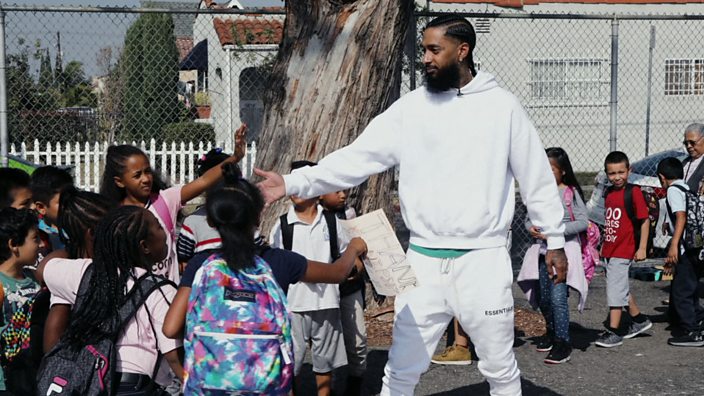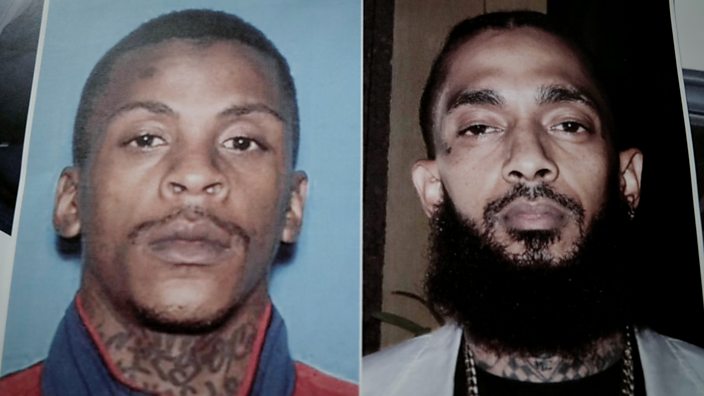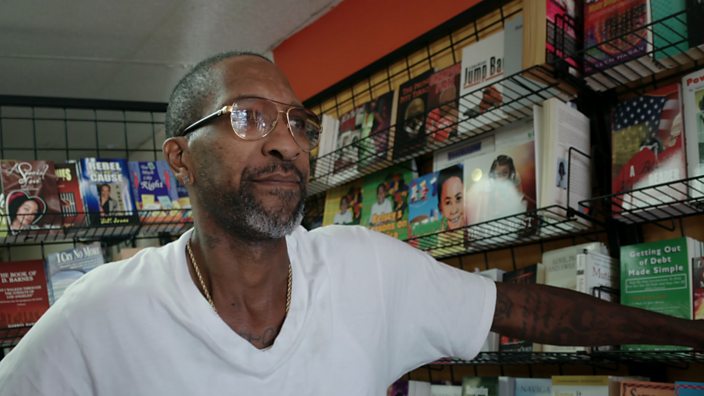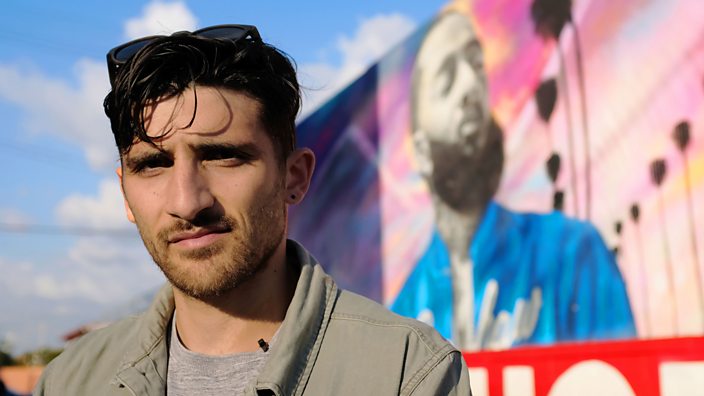
This article is more than
5 year old
At 2:50pm on 31 March last year, the rapper Nipsey Hussle sent out a tweet.
Having strong enemies is a blessing.
— THA GREAT (@NipseyHussle) March 31, 2019
Just 30 minutes later, he was dead.
CCTV footage shows a man approach Nipsey, with a gun in each hand, and open fire on him outside the clothing store he owned in south Crenshaw, Los Angeles.
The man pulled back before returning to shoot him again.
One final time he retreated, before reappearing, shooting Nipsey and kicking him in the head.
The killing horrified fans around the world, with tributes from celebrities including Drake and Rhianna and, very quickly, rumours spread about the murder. In BBC Three's new documentary The Mysterious Murder of Nipsey Hussle, filmmaker Ben Zand speaks to people who knew Nipsey, as well as to LA police and gang members, to investigate the life and death of the world-famous rapper.
Rapper Nipsey Hussle - real name Ermias Asghedom - was born in Crenshaw in 1985.
He was regarded as a hero in his community. He owned a record label and the rights to his own music. He clocked 1.8 billion music streams in one year, won two posthumous Grammys and became an icon around the world, thanks in part to his investment in science and tech projects for underprivileged young people.
"A huge part of the reason people felt attached to Nipsey was [his message of], 'Hey, as black people we need to be building our stuff. We shouldn't be so dependent on white entities to survive," says fan and community organiser Chavonne Taylor.
"Also by encouraging us to join him. That's what all of his music was: 'Join me in this. Let's own our communities'."

But he caused controversy too, accused of homophobia in January 2018 over an Instagram post. He also had numerous run-ins with the law.
Nipsey was part of his local gang, the Rollin 60s Crips, and his music told of the hard streets he was raised on and the gang culture he grew up in.
After Nipsey's killing, the rumours about who was behind it began. Conspiracy theoriesstarted to spread, blaming his death on lots of different groups: the police, the US government, pharmaceutical companies and the Illuminati.
A few months after Nipsey's death, it emerged that the police had been investigating him and his businesses, which gave fuel to the fire on theories of police involvement in his killing.
The LA city attorney's office had been tracking Nipsey's property, alleging it was a hangout for a local criminal gang and that it was the site of attempted murders, shootings and robberies.
The Los Angeles Police Department refused to comment despite numerous requests.
In April last year, police arrested 29-year-old Eric Holder, who's accused of Nipsey's murder. Holder, who maintains his innocence, faces a maximum sentence of life in prison if convicted. His trial is expected to begin in April.

Perhaps surprisingly, Eric and Nipsey were from the same gang. And, according to transcripts at the pre-trial hearing, a conversation allegedly took place between Eric and Nipsey moments before he was shot.
Nipsey apparently accused Eric Holder of being a "snitch". The word "snitch" is mentioned in the transcript 24 times.
It's this that could have been the reason behind Nipsey's murder, according to one LA gang member.
"[Calling someone a snitch] is the worst thing you can say," says Cedric, a long-term member of a local gang. "That's a very bad statement.
"I'm killing you if you call me a snitch."

Cedric also believes that Nipsey was too comfortable hanging around the south Crenshaw neighbourhood he grew up in, even after his phenomenal success.
"Nipsey was stupid," Cedric says. "His gang didn't protect him and they wasn't gonna protect him when he got that money.
"He should have never been at that store without security. But he felt comfortable.
"His success was great but there was just too many haters.
"He thought he was untouchable."
Retired cop Bryan Bentley spent his whole career with the LAPD working in Nipsey's neighbourhood - and he also believes the killing came down to a gang-related conflict.
"He disrespected the person, which is the big rule. You don't disrespect somebody in the hood.
"You don't disrespect people. If you do, you better be ready to defend yourself.
"That's the law of streets. That's the law of how gang members work."
By Ben Zand, Director and Presenter of The Mysterious Murder of Nipsey Hussle
I've made documentaries on a lot of people now, but never have I made one on someone as canonised as Nipsey Hussle.
Nipsey was one of the good guys.
He was someone who departed from the usual idea of celebrity. Less interested in followers on Instagram, more interested in building a real-life following by being the personification of what he preached: 'Empower your community through ownership. Buy back the block. Cut out the middleman. All Money In No Money Out (this was Nipsey Hussle's record label).'

He never left his community, he invested in it to make it a better place. It was the reason he was loved.
But that's what made his murder all the more shocking. How could a man so idolised have been shot at least 10 times outside his own store, in his own beloved neighbourhood?
Nipsey had a history in gangs, and an obligation to those around him to carry them with his success. It's a lot of pressure.
There are a lot of rules in gang life, and ultimately one wrong turn can have deadly consequences.
Watch The Mysterious Murder of Nipsey Hussle on iPlayer in the UK.